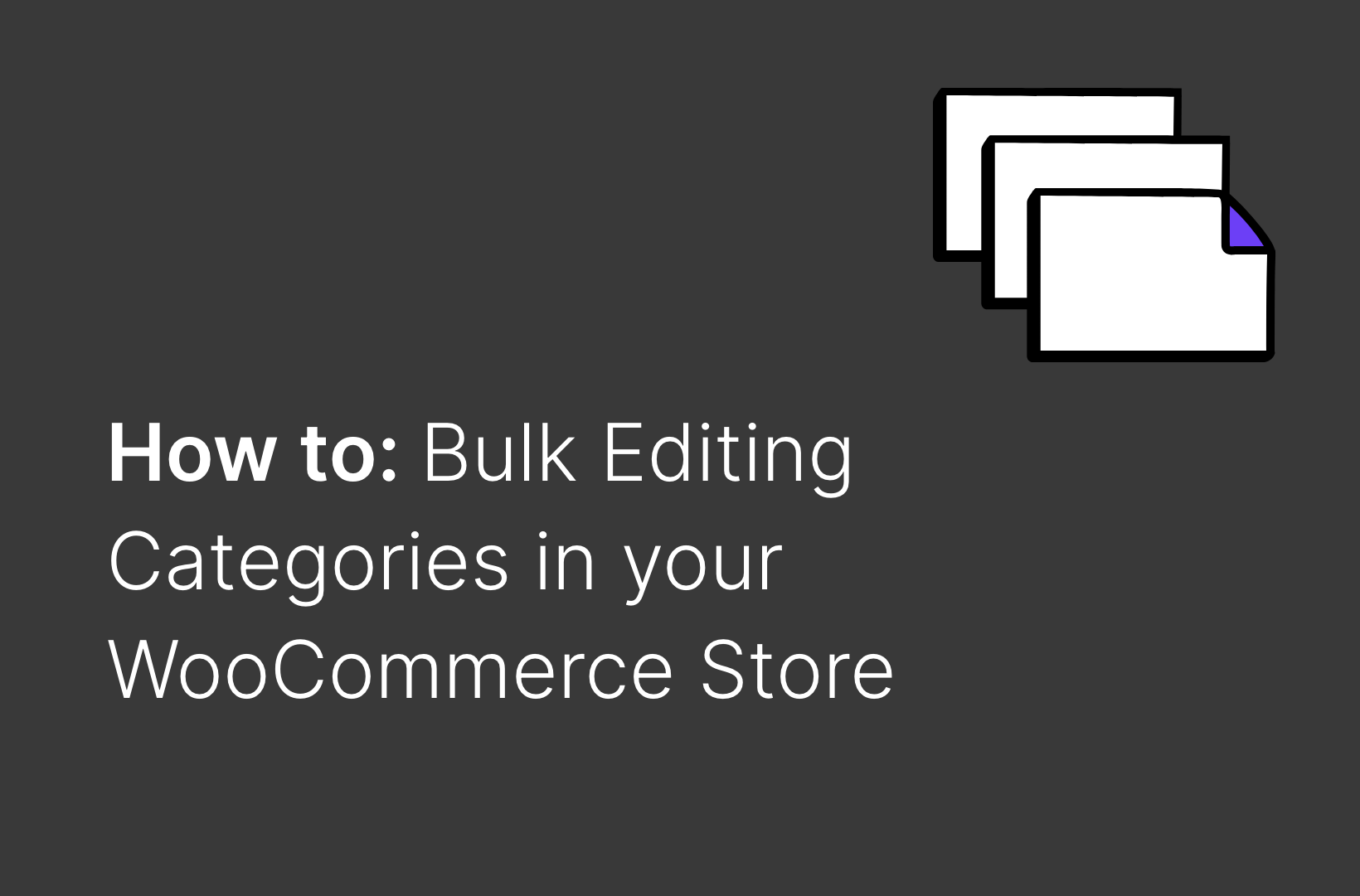Preventing Fraud and Fake Orders: A WooCommerce Store’s Guide

Have you ever considered the true impact of fraud on your WooCommerce store?
In 2022, the eCommerce industry faced over $40 billion in losses due to online fraud. This highlights a harsh reality – no online retailer is immune to the threat of deceitful activities.
Fraudulent transactions can lead to significant financial losses, but the damage doesn’t stop there. The reputation of your WooCwommerce store, painstakingly built over time, can suffer a severe blow. Once your customer trust is compromised, it becomes incredibly challenging to rebuild.
Moreover, the legal implications of fraudulent activities can result in complex disputes and compliance issues for your business, diverting valuable resources away from growth initiatives.
In this article, we’ll guide you to strengthen your online store against fraud. We’ll explore reputable plugins, share best practices, and unveil strategies to help you navigate the complexities of fraud prevention.
Understanding the various types of fraud attacks in eCommerce
An important step in safeguarding your WooCommerce store against these threats is to understand the various forms of fraud attacks. By delving into how these attacks work, the vulnerabilities they exploit, and the mechanisms through which attackers profit, you can fortify your defenses and protect your business.
Carding/card testing fraud
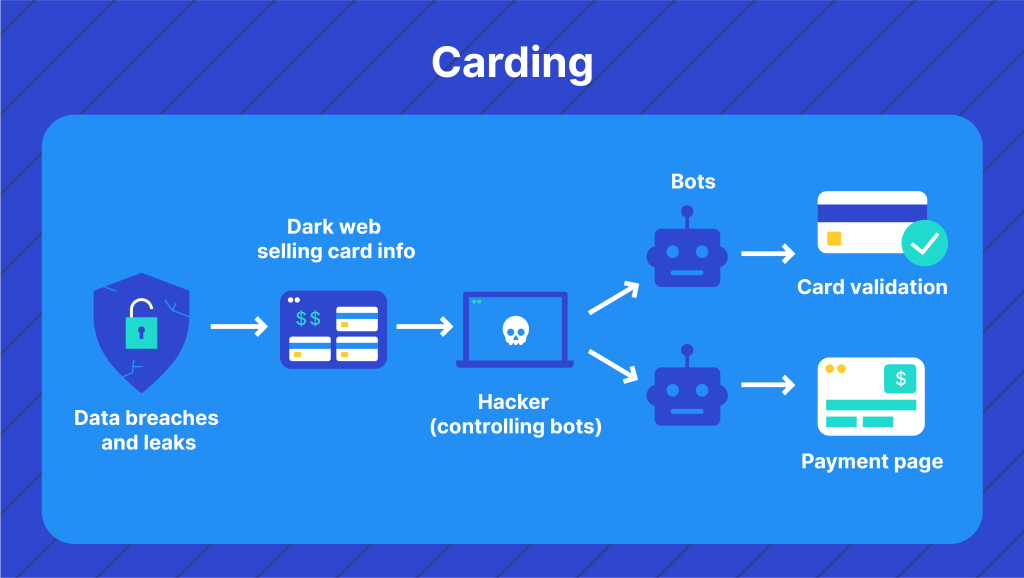
How it works: Carding, also known as card testing fraud, is a type of cybercrime where stolen credit card information is used to make small online purchases to test if the card is still active and valid. This is typically done by automated bots or individuals who use various techniques to obtain credit card details, such as phishing, hacking into databases, or purchasing them on the dark web.
Once they have a list of credit card numbers, hackers or fraudsters will attempt to make small transactions on different websites to check if the card is still active and hasn’t been reported stolen. If the transaction goes through successfully, it indicates that the card is still valid, and the fraudster can then use it for larger purchases or sell it on the dark web to other criminals.
Vulnerability exploited: eCommerce sites with weak or nonexistent anti-spam protection become prime targets for this validation exercise. The lack of CAPTCHA or other anti-spam measures presents an open door for these fraudsters, enabling them to test card details with little to no resistance.
Account Takeover (ATO) fraud
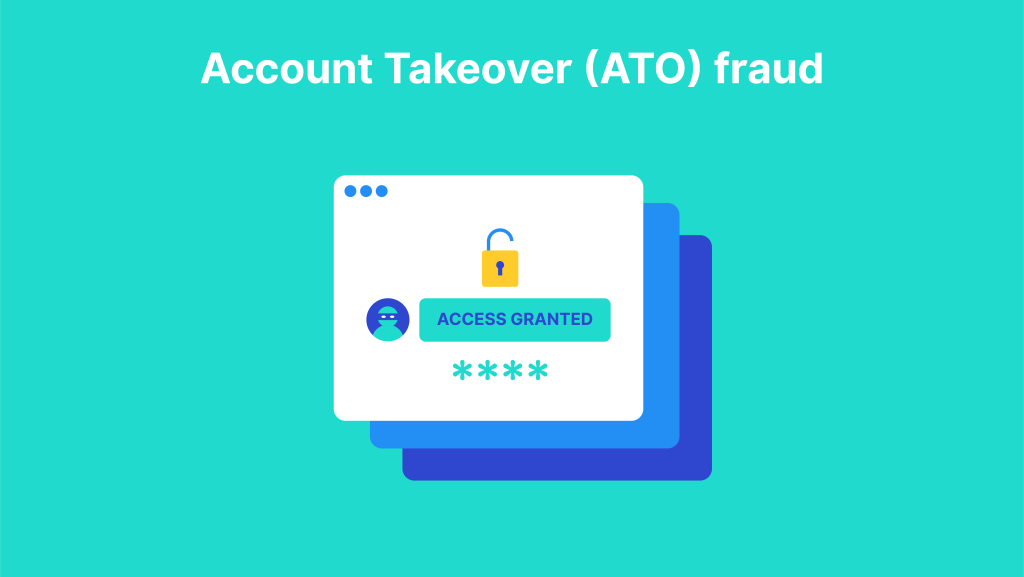
How it works: ATO fraud occurs when a malicious actor gains unauthorized access to a user’s online account, such as a bank account, email account, or social media profile, and takes control of it.
The attacker may then exploit the compromised account for various malicious purposes, including financial theft, identity theft, spreading malware, or launching further attacks. They can use phishing, credential stuffing, or social engineering to do this.
Vulnerability exploited: This type of fraud preys on weak or reused passwords, the absence of Multi-Factor Authentication (MFA), and the general susceptibility of users to phishing schemes.
Friendly fraud
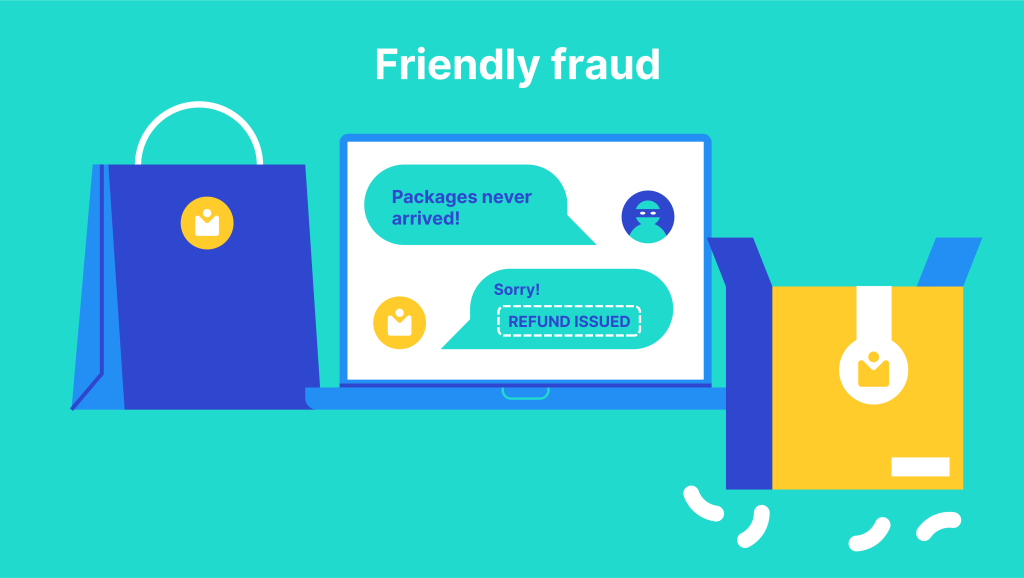
How it works: Friendly fraud occurs when a legitimate consumer makes an online purchase with their credit card and then disputes the charge with their bank or credit card issuer, claiming that they did not authorize the transaction or did not receive the goods or services as described.
However, unlike traditional fraud – where the cardholder’s information is stolen or used without their knowledge – in friendly fraud, the cardholder initiates the chargeback themselves.
Vulnerability exploited: The effectiveness of this fraud type often hinges on chargeback processes that may not rigorously verify the claims made by customers.
Phishing attacks

How it works: Phishing attacks are a form of cyber attack where malicious actors attempt to deceive individuals into divulging sensitive information, such as login credentials, financial details, or personal information, by impersonating trustworthy entities. These attacks typically occur through email, but they can also happen via other communication channels like text messages, phone calls, or social media messages.
Attackers bait users into handing over sensitive information – such as login credentials or credit card numbers – through methods such as email scams, deceptive content, malicious attachments, and social engineering tactics (to manipulate recipients into trusting the sender and taking the desired action).
Vulnerability exploited: Phishing attacks can have serious consequences, including financial loss, identity theft, data breaches, and malware infections. These schemes thrive on the lack of user awareness and education regarding the signs of phishing.
Inventory manipulation fraud
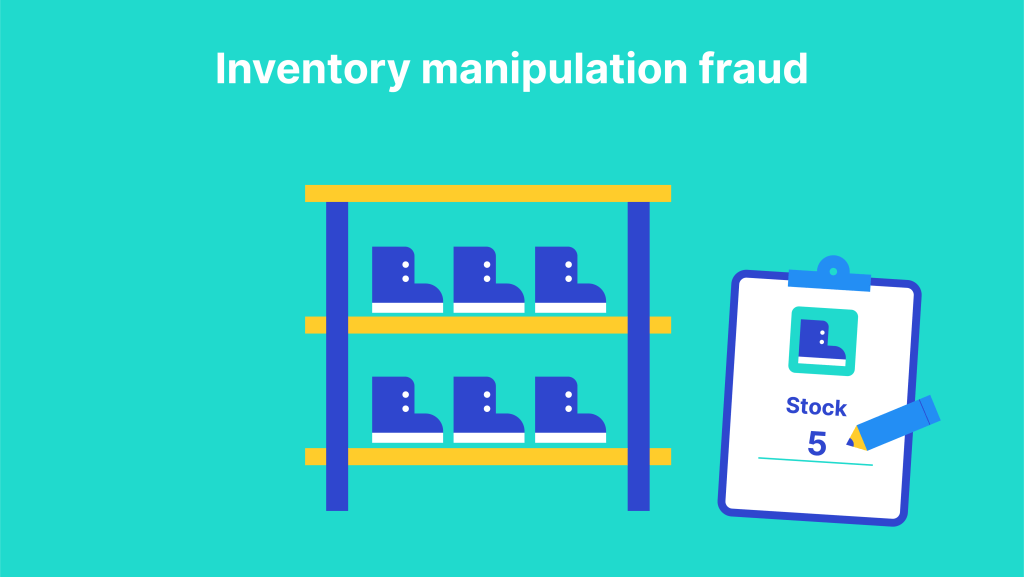
How it works: Inventory manipulation fraud is a type of financial fraud where attackers deliberately manipulate inventory records to misrepresent the value of their inventory or financial position. This fraudulent activity can take various forms and can occur in both physical and digital inventory systems.
Vulnerability exploited: Attackers exploit vulnerabilities in the eCommerce platform’s inventory system, misleading it to display out-of-stock items as available, leading to fraudulent transactions.
Applying security and anti-spam measures to your WooCommerce store
Bear in mind that in addition to the protocols outlined below, some security and anti-spam measures will be handled by your payment processor, such as the implementation of an Address Verification System (AVS), which verifies the billing address provided by customers against the cardholder’s details; and the implementation of a Card Verification Value (CVV) check, which ensures that the person attempting the transaction has physical access to the card.
Use anti-spam settings
Fraudulent activities often begin with seemingly harmless spam, which can quickly escalate into more severe threats. Implementing anti-spam settings will be the first line of defense, protecting your store from the ground up.
Best practices include:
- Restricting user registration to only users you approve.
- Disabling comments on your site to prevent spammy content.
- Turning off link notifications from third-party blogs to avoid backdoor entries.
These measures not only minimize the risk of spam-induced fraud but also enhance the overall security posture of your WooCommerce store.
Google reCAPTCHA integration
Integrating Google’s reCAPTCHA into your WooCommerce store is a powerful tool in the battle against bots. By incorporating reCAPTCHA on crucial interaction points such as login forms, registration pages, and checkout processes, you can effectively thwart automated attacks.

This barrier ensures that only legitimate users can engage with your site. It significantly reduces the potential for spam and automated fraud attempts, keeping your digital environment more secure and user-friendly. However, if not done properly, especially on the checkout, such an integration can have a negative effect on the store’s conversion rate.
Regularly monitor transactions
While leveraging plugins and automated tools for transaction monitoring is essential in the modern landscape of fraud prevention, human oversight remains indispensable
Kostas Seresiotis, Senior Product Engineer at Saucal.
Regular transaction monitoring allows you to quickly identify and respond to unusual patterns that could indicate fraudulent activity. Keep an eye out for red flags such as large orders from new customers, expedited shipping requests to uncommon addresses, orders placed with suspicious billing information, and transactions using unconventional payment methods.
This vigilance helps in the early detection of fraud, enabling you to take swift action to protect your store and your customers. By applying these security and anti-spam measures, you create a more resilient and trustworthy environment for your WooCommerce store.
Set up custom alerts
By configuring notifications for anomalies like unusual transaction volumes, high-value orders, or a series of failed payment attempts, you empower your store with proactive monitoring tools.
These alerts enable you to swiftly investigate suspicious activities, take immediate corrective actions, and thereby minimize potential losses. Implementing custom alerts ensures a secure shopping environment, providing peace of mind for both you and your customers.
Set up secure payment options
The security of your payment gateways is necessary for maintaining a trustworthy eCommerce platform. Utilizing insecure payment options not only risks your customers’ sensitive information but can also tarnish your store’s reputation.
Reputable payment gateways, including WooPayments, offer robust security features that protect against fraud. These platforms ensure that all transactions are encrypted and secure, safeguarding both customer data and your business from potential financial threats.
Set up secure shipping options
Partnering with trusted shipping providers like ShipStation and Shippo ensures the delivery process is as secure as the transaction itself. These providers offer features that help prevent fraud, such as verified tracking and secure delivery options.
For more detailed insights, check out our comprehensive guide on choosing the best shipping option for your business.
Require strong passwords
Enforcing strong password policies for your users can significantly decrease the risk of unauthorized access to customer accounts. WooCommerce offers features to enforce password strength requirements, encouraging users to create complex passwords that are harder for attackers to guess or crack.
Limit login attempts
Limiting the number of login attempts can effectively prevent brute force attacks, where attackers try numerous passwords to gain unauthorized access. Implementing restrictions on how many times a user can attempt to log in over a specific period helps safeguard your store against such intrusions. Various plugins and security measures are available for WooCommerce to easily enable this functionality.
IP geolocation
Utilizing IP geolocation can help identify and flag potential fraudulent activity by monitoring the geographic location of the user. This tool can detect inconsistencies, such as a login attempt from a country different from the billing address, which may indicate fraudulent behavior.
Implement checkout-rate limiting
Checkout-rate limiting is a powerful tool in preventing fraud, especially against those attempting to use your checkout process to validate stolen credit card information. For example, setting a limitation that a user can only place one order every three minutes can significantly deter and prevent such fraudulent activities, safeguarding your store’s financial integrity and customer trust.
Remember, while these steps form a solid foundation for fraud prevention, the dynamic nature of online threats requires ongoing attention and adaptation. Engaging with a specialized agency like Saucal can provide you with the expertise and support needed to navigate these challenges effectively, ensuring your store remains secure, and your customers stay protected.
Exploring anti-fraud plugins for WooCommerce
Dedicated anti-fraud plugins can integrate many of the preventative measures discussed previously, automating the detection and mitigation of fraudulent activities. Before diving into our recommendations, let’s understand the essential features that an effective WooCommerce fraud prevention plugin or service should offer:
Real-time fraud detection: A proficient anti-fraud plugin should offer real-time monitoring capabilities, ensuring that any suspicious transaction is flagged and addressed without delay. This is a must for maintaining a secure shopping environment and preserving customer trust.
Risk scoring and assessment tools: By analyzing various transaction elements, such as purchase behavior and payment details, these tools can assign a risk score to each transaction, helping merchants make informed decisions on whether to accept, review, or decline a transaction.
Customer identity verification: An anti-fraud plugin that includes identity verification measures can significantly reduce the risk of impersonation and other identity-based fraud techniques, ensuring that transactions are legitimate and secure.
Anti-fraud measures: Essential anti-fraud measures, such as reCAPTCHA and thorough order assessments, are fundamental components of a strong defense strategy. For example, the WooCommerce Anti-Fraud plugin implements these measures to evaluate transactions for potential fraud, enhancing store security.
Chargeback guarantees: Some anti-fraud services offer guarantees against chargebacks resulting from fraudulent transactions. This protection shields businesses from financial losses associated with chargebacks, providing an added layer of security.
Automatic responses to fraud: Automatically responding to detected fraud may include options to blacklist certain users, verify payments before processing, and send notifications about suspect orders to save time and reduce the manual workload involved in fraud management.
Custom fraud identification rules: Setting custom rules for identifying potential fraud scenarios allows for a more targeted approach to security, adapting the system to recognize unique patterns that may indicate fraudulent activity.
Blacklisting capabilities: Enhanced security often involves the ability to block or blacklist certain parameters, such as IP addresses, email addresses, and even specific devices. This prevents known fraudsters from accessing the store or attempting transactions, significantly reducing the risk of repeat offenses.
Reporting tools: Comprehensive reporting tools offer insights into the effectiveness of implemented security measures. A dashboard that provides detailed reports on attempted fraud, detected patterns, and the overall performance of the anti-fraud measures is invaluable for continuous improvement and strategy adjustment.
Popular plugins for WooCommerce fraud prevention
⚠️ Please note that the following reviews of WooCommerce fraud prevention plugins are informational and not endorsements. We don’t have direct experience with most of these plugins. Additionally, it’s worth mentioning that an effective alternative to using a plugin is choosing a payment processor equipped with robust anti-fraud solutions. Stripe is an example of such a processor, offering advanced anti-fraud features to safeguard your transactions.
WooCommerce Anti-Fraud
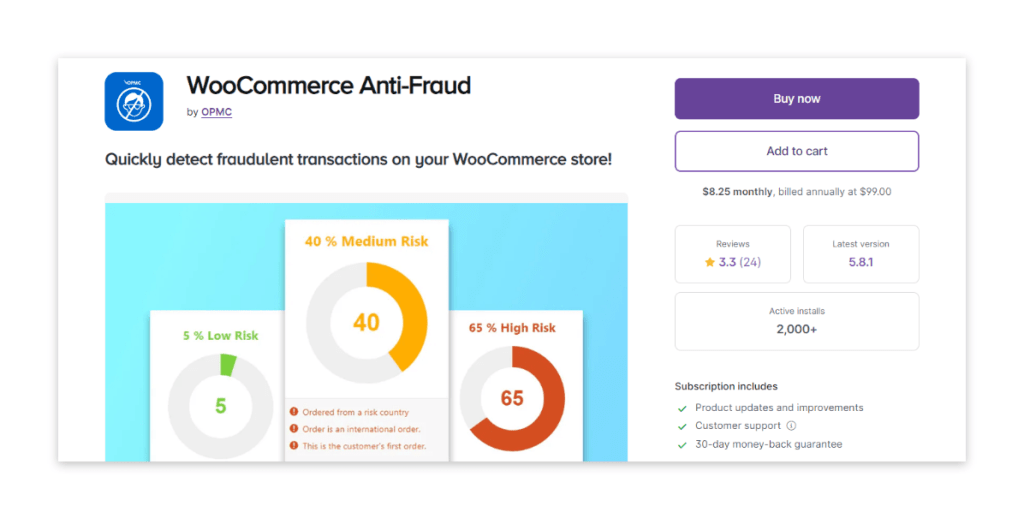
WooCommerce Anti-Fraud quickly identifies and flags potentially fraudulent transactions on your WooCommerce store. It evaluates transactions using a set of predefined rules to assign a risk score, effectively minimizing the risk of fraud.
The key features of this plugin include the automatic blocking of high-risk transactions and the ability to set custom thresholds for risk scores, which can trigger specific actions, such as holding the order for review.
This plugin offers a practical solution for merchants looking to protect their revenue and maintain customer trust.
Fraud Labs Pro for WooCommerce
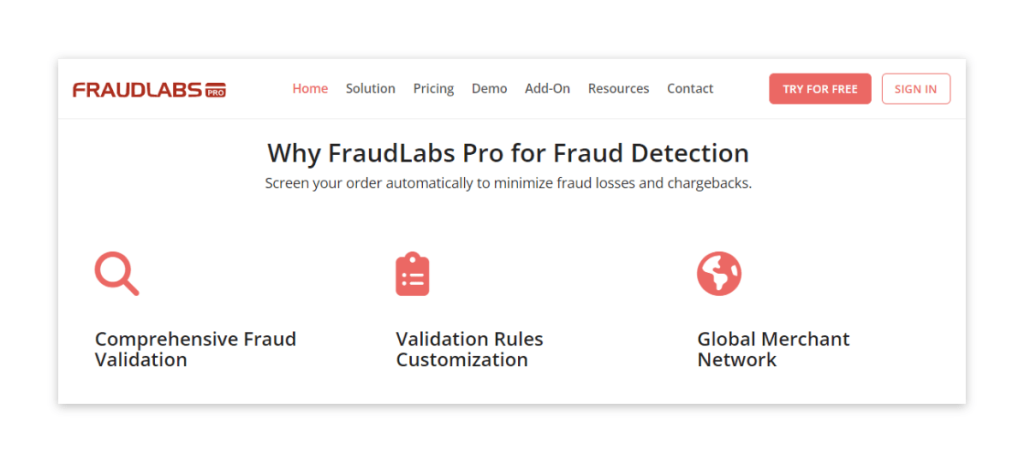
Fraud Labs Pro provides a comprehensive fraud prevention solution tailored for WooCommerce stores. It screens every transaction through its sophisticated fraud detection engine, offering insights with detailed risk scores.
Key features of this plugin include IP geolocation, proxy detection, email analysis, and blacklisting capabilities, allowing merchants to precisely target and mitigate potential fraud risks.
Its flexibility in customizing validation rules makes it a valuable asset for businesses aiming to optimize their fraud prevention strategies.
NoFraud for WooCommerce
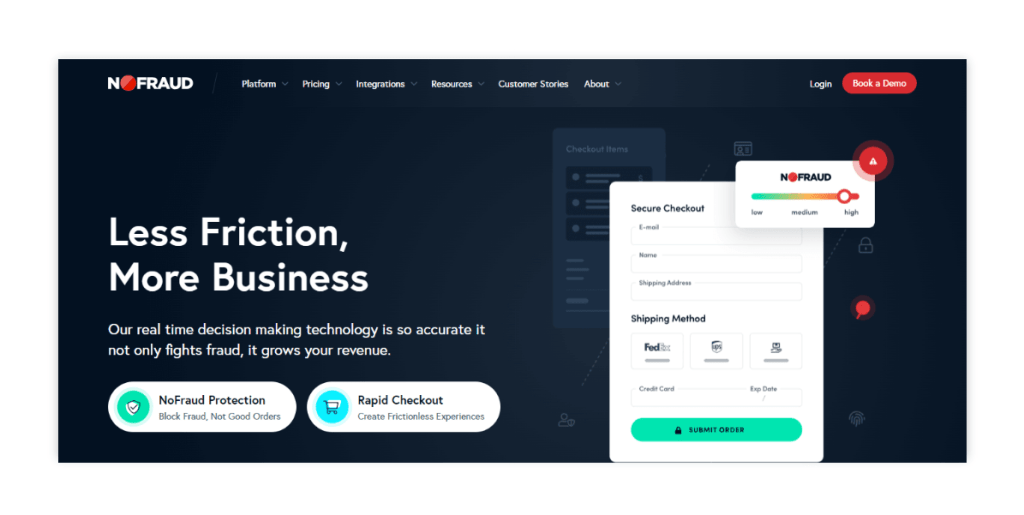
NoFraud offers a real-time fraud prevention service designed to integrate seamlessly with WooCommerce. It performs extensive checks on each transaction, leveraging advanced algorithms and real-time scanning to identify and prevent fraudulent activity.
Key features of this plugin include its chargeback protection service, which provides financial coverage for approved transactions that turn out to be fraudulent.
This plugin is ideal for merchants looking for a hands-off approach to fraud prevention, with the added benefit of direct financial protection against chargebacks.
WooCommerce Anti-Fraud by DotStore
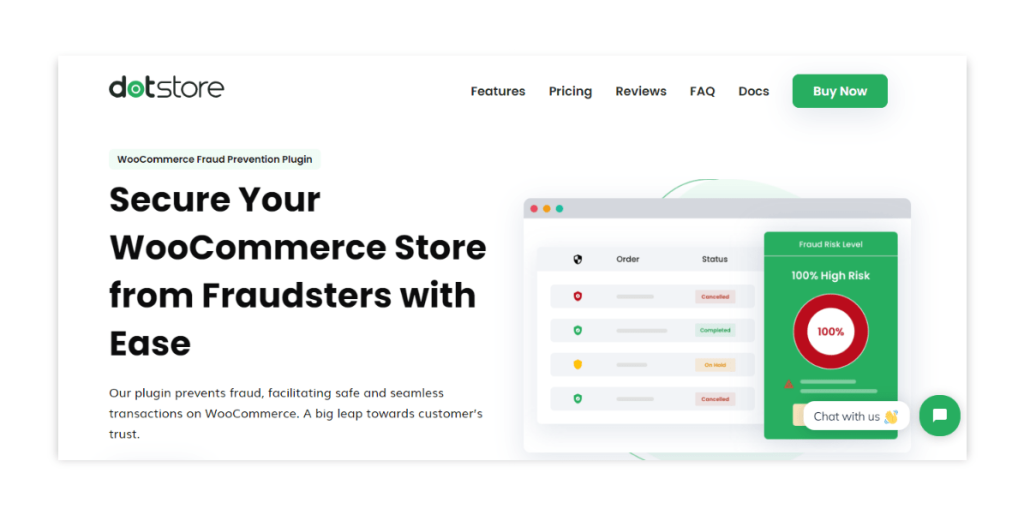
WooCommerce Anti-Fraud by DotStore emphasizes user-friendly and effective fraud detection mechanisms. It includes key features such as real-time order monitoring, risk scoring, and the implementation of security measures like AVS and CVV checks.
The plugin stands out for its ease of use, offering intuitive settings that allow store owners to adjust sensitivity levels and configure specific actions based on risk scores. This makes it an excellent choice for WooCommerce store owners seeking a balance between robust fraud prevention and operational simplicity.
🛡️ While plugins can significantly enhance your store’s security, they should be part of a comprehensive approach that includes secure payment and shipping options, vigilant monitoring, and regular updates to your security protocols.
Considering custom integrations with fraud prevention tools
While the plugins recommended previously offer solid fraud prevention capabilities for many WooCommerce stores, large or enterprise-level businesses often require more sophisticated solutions. These organizations may find that their needs surpass the functionalities available through direct plugin integrations.
In this case, custom integrations provide a bridge to more advanced fraud prevention platforms that don’t natively connect with WooCommerce. At Saucal, we specialize in crafting custom solutions for enterprise-level WooCommerce clients, including seamless integrations between WooCommerce stores and advanced fraud prevention tools, such as:
Sift

Sift is a leading fraud prevention platform that offers enterprise-level businesses a powerful, adaptive solution to combat fraud and abuse. Its standout features include real-time Machine Learning (ML), which continuously adapts to new fraudulent tactics, and a global network of data that enriches its fraud detection capabilities.
Sift’s flexibility in handling large volumes of transactions and its ability to provide a frictionless customer experience make it an excellent choice for businesses looking for robust, scalable fraud protection.
Seon

Seon offers a comprehensive suite of fraud prevention tools tailored to modern eCommerce and fintech applications. Its features include advanced Machine Learning algorithms for real-time fraud detection, email and phone analysis for identity verification, and a unique social media profiling option that adds an additional layer of customer verification.
Seon’s approach to fraud prevention is highly customizable, allowing businesses to fine-tune their defenses based on their specific risk profiles and customer behaviors.
Kount (offered through BlueSnap)
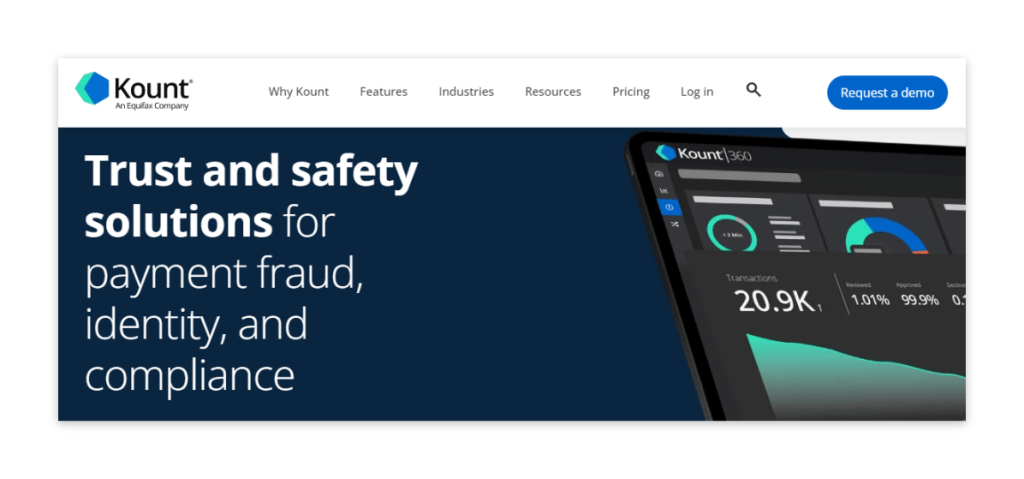
Kount, available as part of the BlueSnap payment processing solution, provides an integrated approach to fraud prevention. It combines advanced artificial intelligence with a vast network of fraud and risk data to deliver real-time fraud detection and analysis.
Kount’s key features include a dynamic scoring system that evaluates transactions for potential fraud and a customizable policy engine that allows businesses to set specific thresholds and rules tailored to their operations. This makes Kount an ideal solution for businesses seeking a comprehensive, integrated approach to fraud management within their payment processing system.
Streamline fraud management with Saucal’s expertise
Prioritizing fraud prevention is a critical component of your business’s success and longevity. For large, enterprise-level stores handling thousands of orders, a singular approach to fraud prevention simply won’t be enough.
Fraud is complex and multifaceted, and thus, a robust strategy incorporating multiple checkpoints is essential. Reliance on a single tool or method introduces vulnerability, a risk no enterprise can afford to take.
As a team of WooExperts, we at Saucal possess profound knowledge in building, maintaining, customizing, and hosting WooCommerce sites. We can guide you on the tools that are right for your business and can develop the necessary integrations where needed
We are more than just a service provider; we’re your dedicated development team, offering round-the-clock support to ensure your eCommerce platform is secure, optimized, and primed for success. We offer a comprehensive suite of services designed to fortify your store against the evolving threats of fraud:
- Managed WooCommerce Hosting: Infused with our proprietary RADAR technology, which continually monitors your site to identify and implement areas of optimization, our Managed WooCommerce Hosting ensures your site is fast, reliable, and secured against the myriad threats facing online retailers today.
- WooCommerce Maintenance service: With routine updates, security checks, and our innovative RADAR system, our WooCommerce Maintenance service ensures your site remains at the cutting edge of performance and security, offering you peace of mind and freeing you to focus on growing your business.
Reach out to Saucal today to guarantee a secure, optimized, and fraud-resistant WooCommerce store. Contact Saucal to get a custom quote tailored to your specific needs and requirements.


